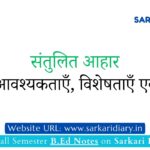Get CTET Notes Based on the Syllabus
CTET exam is for the candidates who aim and aspire to work as teachers in schools like KVS and NVS. CTET exam consists of two papers – Paper I and Paper II respectively. Paper I is written by candidates wishing to teach Primary Classes I-V, and Paper II is taken by candidates wishing to teach Classes VI-VIII. While preparing for any type of competitive exam it is important to do the necessary preparation; The same thing applies with CTET exam also. Candidates must have a proper preparation program and effective CTET study material to enhance and enhance their performance in the CTET exam.
CTET Notes for Child Development and Pedagogy (CDP)
Most of the students are afraid of the subject Child Development and Pedagogy. This fear stems from a lack of understanding of fundamental concepts, which can lead to confusion and anxiety during the exam. By avoiding topics that initially seem difficult, students inadvertently create a backlog of material that can cause significant stress on test day. To effectively overcome this challenge, students should use high-quality CTET study materials and appear for practice quizzes regularly to ensure comprehensive understanding of the subject matter. Complete and well-organized CTET notes can streamline the preparation process significantly.
| CTET Notes for Child Development and Pedagogy | |
| Topics Name | CTET Notes Link |
| Piaget Theory of Moral Development | OPEN |
| Kohlberg’s Theory of Moral Development | OPEN |
| Vygotsky Theory of Socio-Cultural Development | OPEN |
| Development Principles | OPEN |
| Intelligence and it’s Theory | OPEN |
CTET Notes Overview
The Central Teacher Eligibility Test (CTET) is a mandatory national-level test for teachers in India. The exam is conducted in both English and Hindi and consists of two papers: Paper 1 for teachers of Classes 1 to 5, and Paper 2 for teachers of Classes 6 to 8.
| CTET Notes Overview | |
| CTET Full Form | Central Teacher Eligibility Test |
| Exam Conducting Body | Central Board of Secondary Education |
| Exam Level | National |
| Exam Name | CTET 2024 January |
| Exam Mode | Offline |
| Language of Paper | English and Hindi |
| Paper Levels | CTET Paper 1 (Classes 1 to 5) |
| CTET Paper 2 (Classes 6 to 8) | |
| Duration of CTET Paper 1 (Grade 1-5) | 150 minutes |
| Duration of CTET Paper 2 (Grade 6-8) | 150 minutes |
| CTET Admit Card 2024 | Two Days before the day of Examination |
| CTET Exam Date 2024 | 21 January 2024 |
| CTET Answer Key 2024 | To be notified |
| CTET Result 2024 | By the end of February 2024 (Tentative) |
| Helpline Contact Number | 011-22240112 |
| Official Website | www.ctet.nic.in |
Syllabus: Get CTET Notes Based on the Syllabus
Candidates who want to qualify CTET exam must have the revised and latest syllabus to enhance their preparation level. CTET syllabus is prepared by the Central Board of Secondary Education. Paper 1 question paper has secondary education standards, and Paper 2 is set in senior secondary level difficulty. Students should have the ability to solve the question paper in one go.
Before getting to know the syllabus, candidates must know the Subjects for the respective papers.
Candidates can check out the CTET Study Material here to do their best preparation!
| CTET Subject wise Syllabus in Detail | |
| CTET Paper 1 Syllabus | CTET Paper 2 Syllabus |
| CTET Maths Syllabus | CTET Science Syllabus |
| CTET Social Science Syllabus | CTET English Syllabus |
| CTET Hindi Syllabus | CTET Sanskrit Syllabus |
| CTET Telugu Syllabus | CTET Bengali Syllabus |
CTET Exam Weightage
Candidates must practice rigorously and regularly to clear the CTET Exam. Students must know the tactics to gain marks easily, for which they must know how many marks each subject carries. The table below shows the paper-wise weightage for each subject of the CTET Exam.
CTET Paper 1 Weightage
| S. No | Subject | Marks |
| 1. | Child Development and Pedagogy | 30 |
| 2. | English (Language I) | 30 |
| 3. | Hindi (Language II ) | 30 |
| 4. | Mathematics | 30 |
| 5. | EVS | 30 |
CTET Paper 2 Weightage
The setting of Paper 2 is slightly different, candidates can either choose Math’s/ Science which carries 30+30=60 marks or they can go for Social Studies which carries 60 marks. Candidates choose this according to their area of study.
| S. No | Subjects | Marks |
| 1. | Child Development and Pedagogy | 30 |
| 2. | English (Language I) | 30 |
| 3. | Hindi (Language II) | 30 |
| 4. | Mathematics/ Science | 30 |
| 5. | (or) Social Science | 60 |
CTET (Important Books for Preparation)
For your convenience, some of the best CTET books recommended by professionals are listed below. Candidates can purchase these books online or from their local stationery store. Although there are many more books available online, these are a few of our favorites.
| Section | Books | Publisher | Author |
| Child Development and Pedagogy | A Complete Resource for CTET: Child Development and Pedagogy | Pearson | Sundeep Kumar |
| English | CTET English & Pedagogy (Paper I & II) | Pearson | Geeta Sahni |
| Mathematics | Mathematics and Science for CTET Paper II | Pearson | Hankeet Gandhi and Yukti Sharma |
| Social Studies | CTET Success Master Paper-II Teacher Selection for Class VI-VIII Social Studies/Science | Arihant | —- |
| Science | CTET Success Master Science | Arihant | —- |
CTET Notes for English Language Pedagogy
- Language Teaching Principles: Language is a fundamental form of communication, defined as verbal, physical, and biologically innate. Students are taught various language teaching principles in this subject, enabling them to express their ideas, thoughts, and feelings effectively.
- Listening and Speaking Skills: Listening and speaking skills, inextricably linked, play a crucial role in language acquisition. These skills are mutually dependent, fostering intertwined processes of thinking and understanding. Listening and speaking are integral components of the four fundamental language skills: listening, speaking, reading, and writing (LSRW).
- Language Function: Children acquire language through the LSRW pattern, establishing a foundation for effective interpersonal communication. Language learning is built upon the four language skills of listening, speaking, reading, and writing (LSRW). Each of these activities aims to develop and enhance these fundamental language skills in children.
- English Language Policies: Efforts have been made to align research findings with policy and socio-economic realities. This perspective outlines a recommended language policy for urban and semi-rural schools in India, incorporating insights from research in cognitive neuroscience, early childhood psychology, bilingualism, and language learning.
- Learning and Acquisition: Learning involves acquiring new skills or knowledge and refining existing ones. An individual’s knowledge and behaviour undergo a transformation as a result of learning.
CTET Notes for Science
The science section is crucial for CTET paper 2 candidates with a science background. These comprehensive CTET Notes for Science cover essential topics, including content and the pedagogy section. Review the CTET paper 2 notes for Science and tailor your CTET preparation strategy accordingly. Below, you’ll find the complete CTET Science Notes to aid in your preparation for the upcoming CTET 2024 Exam.
Content
- Living World: Cells and their structure, plant kingdom, plant physiology
- Matter and its states: States of matter, classification of matters, inner conversation, atomic structure
- Food: Components of food and preservation
- Materials of daily life: Acids, bases, fibers, polymers
- Environment: Ecosystem, biodiversity, conservation
Science Pedagogy
- Objectives of teaching science: Developing scientific curiosity, encouraging critical thinking, fostering problem-solving skills
- Teaching strategies for science: Demonstration, experimentation, inquiry-based learning
- Assessment methods for science: Observation, written tests, projects
- Role of technology in science teaching: Using multimedia resources, integrating digital tools.
CTET Notes for Hindi Language Pedagogy
Hindi Language is a subject of 30 marks with total 30 questions. The level of questions is easy to moderate. Questions are asked about principles, teaching methods and teaching materials. Unseen excerpts or poems are also asked from this section, which carries 5-6 marks. To score more than 23 marks in this section, you should refer to the following subjects:
- भाषा शिक्षण में सुनने और बोलने की भूमिका
- भाषा शिक्षण के सूत्र और विधियाँ
- अधिगम और अर्जन पर हिंदी शिक्षण
- भाषा कौशल की शिक्षण विधियाँ पर अध्ययन
- भाषा शिक्षण के सिद्धांत
- भाषा कौशल एवं इसके प्रकार
CTET Notes for Environmental Studies
CTET aspirants must focus on Environmental Studies (EVS) as it plays a crucial role in CTET Paper 1 preparation.
- Role of Textbooks
Teachers can utilise textbooks as a valuable resource for planning and structuring their instruction. Textbooks provide a comprehensive and organised presentation of information, making them an effective tool for imparting knowledge to students. By carefully reviewing textbooks, teachers can create lesson plans that align with the curriculum and effectively engage students in the learning process.
- Pedagogy Process Skills in EVS
Through EVS instruction, children develop a range of essential process skills. These skills, which are crucial for critical thinking and problem-solving, include:
- Observation and Reporting: Children learn to observe their surroundings carefully and accurately and to communicate their observations clearly and effectively.
- Discussion: Children engage in meaningful discussions, expressing their ideas and perspectives while actively listening to others.
- Expression: Children develop their ability to express themselves through various forms, including verbal, written, and artistic expression.
- Explanation: Children learn to explain concepts, ideas, and processes in a clear, organised, and logical manner.
- Classification: Children develop their ability to categorise and classify objects, events, and ideas based on their characteristics and relationships.
- Questioning: Children cultivate a sense of curiosity and inquiry, asking thoughtful questions that stimulate further exploration and understanding.
- Analysis: Children learn to break down complex information into smaller, more manageable parts, identifying patterns, relationships, and causes and effects.
- Experimentation: Children engage in hands-on experimentation, testing hypotheses, and drawing conclusions based on their observations.
- Concern for Justice and Equality: Children develop an awareness of social justice issues and a commitment to promoting equality and fairness.
- Cooperation: Children learn to work collaboratively with others, sharing ideas, solving problems, and achieving common goals.
- Pedagogy Teaching Tools
Learning resources play a vital role in facilitating active learning and enabling students to achieve the objectives of instruction. These resources encompass a wide range of materials, situations, and experiences that support the learning process. By incorporating a variety of learning resources into their instruction, teachers can enhance student engagement, promote deeper understanding, and cater to diverse learning styles.
- Scope and Pedagogical Dimensions of the Theme
The theme-based syllabus is designed from a child-centred perspective, incorporating themes that provide a common thread across social studies, sciences, and environmental education. The overarching theme of ‘Family and Friends’ encompasses four sub-themes:
- Family and Friends: Relationships, Work and Play, Animals, and Plants
- Food
- Shelter
- Water
- Travel







